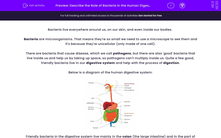Bacteria live everywhere around us, on our skin, and even inside our bodies.
Bacteria are microorganisms. That means they're so small we need to use a microscope to see them and it's because they're unicellular (only made of one cell).
There are bacteria that cause disease, which we call pathogens, but there are also 'good' bacteria that live inside us and help us by taking up space, so pathogens can't multiply inside us. Quite a few good, friendly bacteria live in our digestive system and help with the process of digestion.
Below is a diagram of the human digestive system:

Friendly bacteria in the digestive system live mainly in the colon (the large intestine) and in the part of the small intestine which is further away from the stomach. The rest of the small intestine, the oesophagus and the stomach are bacteria-free. That's because enzymes (these help to break down food) and acid in the stomach make it impossible for bacteria to survive there.
Friendly gut bacteria however, have evolved in order to withstand the harsh conditions of our digestive system.

The main advantage of having friendly bacteria in the gut is to protect us against harmful bacteria that could cause infection and invade the cells of the intestinal wall. Additionally, bacteria help with the digestion of materials that we can't break down fully, like hard plant material.

A lot of the vitamins from vegetables would go to waste if it wasn't for the friendly bacteria that digest them for us. Some species of bacteria even produce vitamins K and B that are hard for us to get from food. Bacteria also help to keep the right balance of acids in our body and break down some drugs. They also break down hormones not needed anymore and toxins that would be potentially dangerous to our health. Phew! That's a lot of jobs for bacteria!
The population of bacteria in our gut is renewed regularly - about half the dry mass of our faeces (that's science speak for poop!) consists of bacteria.
While it might seem strange to think that there are around 100 trillion other organisms living inside us, they're very important to our health.
In this activity, we'll describe what bacteria are and what they do in the digestive system.








